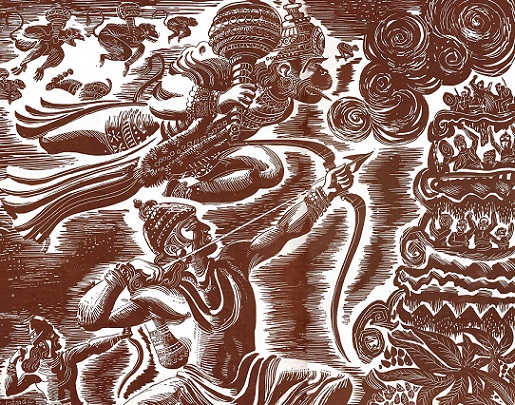(Click to enlarge illustration of Hanuman fighting with Rama by Ric Estrada, BTG #21, 1968)
Devotee: A devotee, he can be very poor, but is it okay if he's hankering after something for Kṛṣṇa? He sees, "Oh we haven't got anything. We need a house," or something like that? Why can't we... Can a devotee think like that, "Why can't we get a nice house like these people for Kṛṣṇa"? Is that all right?
Prabhupāda: Devotee thinks, "Why shall we not have a nice house?"
Devotee: For Kṛṣṇa.
Prabhupāda: Oh, for Kṛṣṇa he can have anything. That is a different thing. Not for himself. For himself, he should be satisfied whatever Kṛṣṇa offers. That's all. But for Kṛṣṇa he'll try to... Just like the example is Hanuman. Hanuman, he fought with Rāvaṇa. Why? Not for his personal sake. He did not fight with Rāvaṇa to take the kingdom of Rāvaṇa, become king there. No. He fought for Rāma. So the Kṛṣṇa consciousness person's endeavor should be to give everything to Rāma. Not... But for himself he's completely dependent on Kṛṣṇa whatever position he may keep. It doesn't matter. He has no such perception, "Whether I'm..." He's always happy. Kṛṣṇa's service is so nice that he has no other idea what is happiness except Kṛṣṇa's service. So why shall he desire this or that? Naturally, he has no desire because he's already fulfilled his desire being in Kṛṣṇa consciousness. But those who are thinking that "Becoming Kṛṣṇa conscious I shall become very rich, I shall become one of the richest men," that is his foolishness. That means he's not in Kṛṣṇa consciousness. He still requires to be more advanced. But actually one who is Kṛṣṇa conscious, that very consciousness is so happy that he doesn't want anything more. That very consciousness is happiness. Ahaituky apratihatā. There is no other cause. A real Kṛṣṇa conscious person does not become Kṛṣṇa conscious for any other purpose. That Kṛṣṇa consciousness is his purpose. That is the end. That is the means. It is not a means to achieve some thing else. Bhakti is such thing. Therefore bhakti is transcendental. It is not material, that...
In the material world, in exchange of something you get something else, but in the spiritual world the endeavor and the achievement the same thing. So actually, a person who is in Kṛṣṇa consciousness, he has no such desire. Anyābhilāṣitā-śūnyam. The exact definition you'll find in the Bhakti-rasāmṛta-sindhu: anyābhilāṣitā-śūnyam. Śūnyam means completely devoid of any other desires. Anyābhilāṣitā-śūnyaṁ jñāna-karmādy-anāvṛtam (CC Madhya 19.167). And uncovered by the activities of knowledge or fruitive action. Ānukūlyena kṛṣṇānuśīlanam. Simply acting in favor of Kṛṣṇa: "Kṛṣṇa wants this, I shall do it." "Kṛṣṇa wants this fight"—Arjuna did it. Not for himself. We shall keep always in mind that Arjuna was engaged into fight not for his personal self. For his personal self he denied: "Oh, what shall I do with this kingdom by fighting with my brothers and grandfather? No. Kṛṣṇa, excuse me. I cannot fight." But when he understood that the fight is to be done for Kṛṣṇa, he took all the responsibility. Similarly, a Kṛṣṇa conscious person will not aspire anything for his sense gratification, but he will aspire for all the world for Kṛṣṇa's service.
(Srila Prabhupada Lecture, Montreal, July 14, 1968)
.
